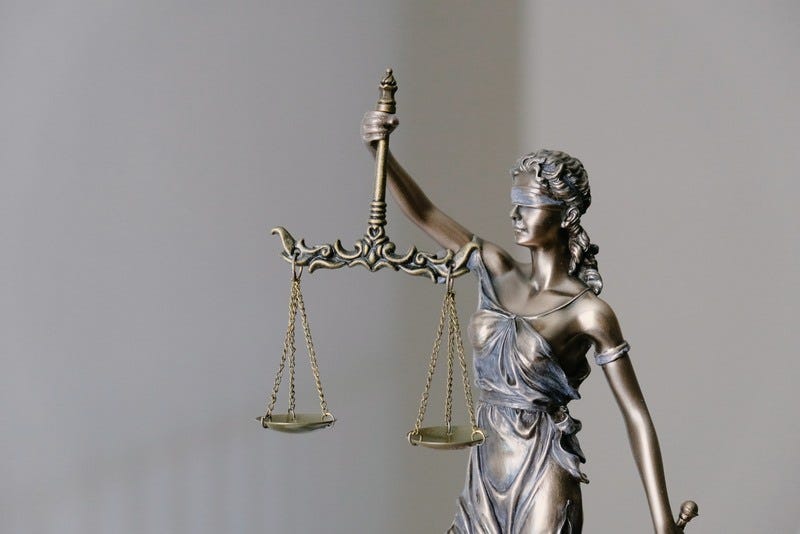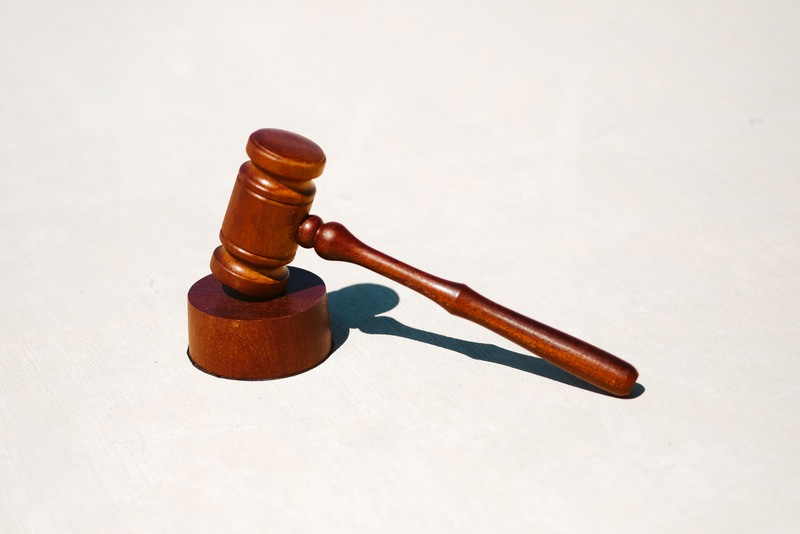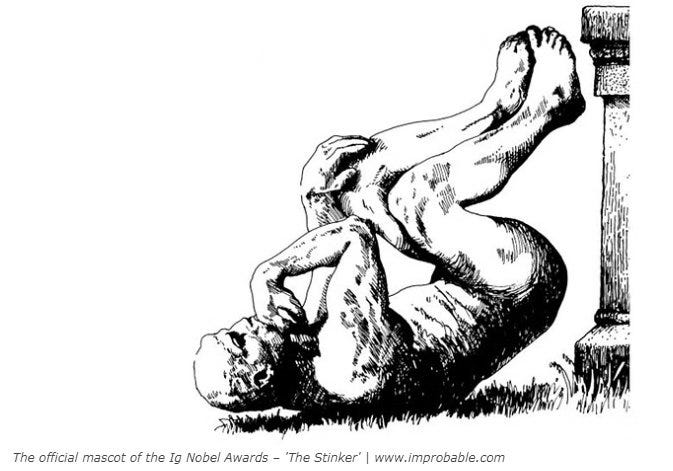Making Them Laugh, Making Them Think
The profound joys of the silliest awards in modern science.
Hello! This is Everything Is Amazing, a newsletter about curiosity, science, awe, wonder, and things that turn your view of the world inside-out (like the work of this chap).
It’s been a while. Please forgive me! Reason being: I’m unexpectedly moving house - I’m leaving behind this wooden cabin I’ve been occupying in this corner of Scotland since I started this newsletter back in January 2021, and I’m moving into a thoroughly lovely little rented flat a couple of miles away.
It all feels like…well, I might not quite be rejoining society, but I will once again be within hollering distance of it? All very strange. Kinda makes me want to sleep on the beach again. Stay tuned for my inevitable meltdown.
But while I’ve been in rucksack-lugging limbo, I had the chance to try Substack’s new thing, which launched last week.
It’s called Notes, and while it looks more than a little like Twitter at first glance, so far it has a very tiny amount of the negativity, cynicism and performative cruelty of that platform on one of its bad days (which have been occurring more frequently in recent months, as I said here).
Update: okay, maybe more than a very tiny amount. Definitely some toxic-user-behaviour bugs that need ironing out before it’s ready for everyone, I’d say.
Substack Notes hasn’t really been properly put through the social media wringer yet (but see above update), in terms of the meanest folk trying to do the nastiest things with it, but so far I’m cautiously hopeful. And the tone so far is lovely: Delia Cai at Vanity Fair described is as “so freaking genteel”.
I’ve started experimenting with a few threads of notes in the style I was using on Twitter, like this one:
Anyway, it’s available on both the Substack app (iOS & Android) and the Web/browser version - all the details are here. Give it a go, if that looks like your kind of thing.
Okay! Today, we’re taking a look at an important scientific question that will probably end what I laughingly call my career: what is it with lawyers, and what can be done about it?
It’s the middle of 2022, and MIT scientists Edward Gibson and Eric Martinez, with the help of visiting researcher Francis Mollica, believe they have at last scientifically proved something that the rest of us have known all along: that saying rude things about lawyers is entirely justified.
Or rather, one specific aspect of their working lives: the way they write.
Of course, that’s judgemental criticism from the perspective of the rest of us, not necessarily from people working in law, whom through years of dedicated training have learned to endure the way many legal documents are written, and perhaps even enjoy it - which is incredibly impressive if you think about it, which you probably shouldn’t for very long.
You don’t have to look far to see popular criticism of “legalese,” the written language of the law. Merriam-Webster calls it: “the language used by lawyers that is difficult for most people to understand; legal jargon.”
And if that wasn’t damning enough, The Oxford Guide to Plain English pulls none of its punches:
“Fog in the law and legal writing is often blamed on the complex topics being tackled. Yet when legal texts are closely examined, their complexity seems to arise far less from this than from unusual language, tortuous sentence construction, and disorder in the arrangement of points. So the complexity is largely linguistic and structural smoke created by poor writing practices.
Legalese is one of the few social evils that can be eradicated by careful thought and disciplined use of a pen. It is doubly demeaning: first it demeans its writers, who seem to be either deliberately exploiting its power to dominate or are at best careless of its effects; and second it demeans its readers by making them feel powerless and stupid.”
Yikes.
But wait - this is the law. Surely it’s not meant to be “accessible” - it’s meant to be precise? It’s the written equivalent of machine code, where a single misplaced digit can render the whole thing useless, potentially toppling the mightiest of court cases with tiny fragment of ambiguous grammar that lets the hero or villain walk free, accompanied by loudly clicking cameras, out-thrust microphones and a swell of triumphant or ominous music? (Note to self: watching Daredevil & She-Hulk is not credible research for writing a newsletter like this.)
And this certainly seems true. I should check with an actual lawyer next time, but - yeah? Surely legalese is there primarily to be functional.
So the question becomes: is its apparent near-incomprehensibility to us laypeople an unavoidable consequence of extreme functionality in communication, or - well, is the Oxford Guide to Plain English actually onto something here?
Gibson, Martinez and Mollica decided to blunder in and find out.
Martinez was a Harvard Law student at the time, and in Gibson’s words: “We immediately connected because I have been fascinated by the complexity of legal language, but I don't know anything about law."
To begin with, the researchers analysed thousands of legal documents comprising millions of words, using text analysis tools to hunt for recurring patterns. By comparing with non-legal literature, they concluded the following were unique features of legalese:
unnecessary jargon
offputtingly passive sentence structures (“the moon was jumped over by the cow,” to cite a hopefully fictitious example)
super-weird CAPITALIZATION of various provisions for no apparent reason than to MAKE THEM STAND OUT like they’re someone’s UNCLE on FACEBOOK trying to make themselves UNDERSTOOD
So far, so predictable. But then they asked the important question: do these features actually get in the way of comprehension?
"There are attempts to simplify legal language going back to the 1970s, which single out the passive voice, but we found it doesn't affect comprehension," said Gibson. "Before replacing 'legalese' with something comprehensible, we first need to figure out what actually makes it difficult to read."
Their main takeaway was that the jargon and the passive voice and the ALL CAPS indeed had a part to play - but the major obfuscating factor was the way that lawyers tend to bundle their clauses in the middle of sentences.
For example, from their study: “In the event that any payment or benefit by the Company (all such payments and benefits, including the payments and benefits under Section 3(a) hereof, being hereinafter referred to as the ‘Total Payments’), would be subject to excise tax, then the cash severance payments shall be reduced.”
Gibson notes:
"When lawyers want to add conditions to a contract, they tend to pile them up at the center of a sentence, creating a very long sentence. That's horrible for all humans to understand. It's a memory problem — you have these long-distance connections within one sentence that should be several separate sentences. It's much harder for both production and comprehension."
Martinez adds: "We found that even lawyers have a hard time reading these sentences."
So by lifting the clauses out and rendering them into accompanying sentences, you’d get:
“In the event that any payment or benefit by the Company would be subject to excise tax, then the cash severance payments shall be reduced. All payments and benefits by the Company shall hereinafter be referred to as the ‘Total Payments.’ This includes the payments and benefits under Section 3(a) hereof.”
In their summary in the published study in the journal Cognition, the researchers (while admitting they still had much to learn about the reasons lawyers might choose to write that way) concluded that it seemed possible to not write that way and yet still retain the necessary precision in that writing to allow it to efficiently perform its intended role in the legal system.
Or putting it less wordily:
LEGALESE IS UNNECESSARILY DIFFICULT TO READ.
Now, this may make you shriek oh, super job, everyone. High fives all round. What an excellent use of everyone’s time, including mine, after having sat through a thousand words about this already bleedin’ obvious thing. What next? Shall we study whether water is wet?
(And I’d answer: hey, woah, yes, that would make a great study! But I’d say it silently, in my head, to avoid getting punched.)
Mollica told the website RollOnFriday:
"We are not interested in casting shade on people. Most of the lawyers we talk to are sympathetic and want to effectively communicate to people and we appreciate their help with our investigations". he said, adding that he didn't know if similar issues plagued the UK's legal documents, "but I wouldn't be surprised".
"Now, we’ll build on this to see why legal text is written this way and what kind of interventions could improve people’s interactions with legal writing."
And for their painstaking efforts and pioneering spirit, Gibson, Martinez and Mollica were later invited to Harvard, where in a glittering ceremony streamed worldwide, a Nobel prize winner awarded them the 2022 Ig Nobel Prize for Literature - along with a 10 Trillion Zimbabwean Dollar bill and a special 'build your own knowledge container,' which the rest of us would recognise as a paper bin.
On the face of it, this may look disrespectful. You pour your heart and soul into your super-specific research, and the scientific world laughs in your face this hard?
(Fun related fact: in Russia, the term “British Scientist says” is the start of a popular internet meme mocking allegedly pointless research. I wonder how they feel about the Ig Nobels?)
But for me, the joy of these particular awards, and what makes them so special, is that it’s not cruel ridicule - it’s affectionate ridicule.
Everyone involved in the ceremony gets that every entrant works in a valuable and interesting niche of scientific study - including the work of Gibson, Martinez and Mollica. After all, they’re more or less following in the footsteps of work like The Complete Plain Words by Sir Ernest Gowers, a beautiful, much-reprinted book designed to teach British civil servants how to write as clearly as possible. Clarity and efficiency in communication is incredibly important, and surely especially so in law?
But it’s also, at the same time, poking fun at them - because “Prize-winning research proves lawyers write real bad” is a headline that should make everyone laugh (and in doing so, drive a huge amount of publicity to the study and everything it actually stands for).
The Ig Nobels aren’t as well-known as other satirical award ceremonies. You’ve probably heard of the Darwin Awards, which “recognizes individuals who have supposedly contributed to human evolution by selecting themselves out of the gene pool”. And yes, some of its ‘honourable mention’ entries have made me laugh, where someone did something mindbogglingly daft and somehow lived to tell the tale. But there’s an inherent cruelty in the Darwins that’s never sat easy with me - and if you take a closer look, and remember these were actual human beings, every one of its stories seems to be the visible end of a genuine tragedy which you’re being encouraged to mock. I’d - rather not?
But the Ig Nobels are different. Almost all the winners are being invited in, to share the joke and poke fun at themselves - while knowing the fun is good-natured and not actually disrespectful, since everyone understands that Actual Science happened here.
And sometimes, that work is really good. In 2000, Sir Andrew Geim was joint-awarded the Ig Nobel for Physics, along with Michael Berry, for their work in levitating a frog using diamagnetism. Ten years later, Geim would joint-win the actual Nobel Prize for Physics for his work with the carbon allotrope Graphene, a material that’s currently making headlines for how it’s unlocking all sorts of new scientific breakthrough.
But the Ig Nobels are also intentionally daft. They make a priority of aiming for a LOL - like how, in the very first Ig Nobel ceremony in 1991, then-US-Vice-President Dan Quayle won in the Education category “for demonstrating, better than anyone else, the need for science education.”
(I also love their description of him: "consumer of time and occupier of space.")
It’s about using humour as a tool for positive change - to shine a light on scientific research that’s quietly doing fascinating things, while also pointing out the deeply hilarious ridiculousness of…well, everything, really?
The best thing you could do with the next half-hour is to stop reading this newsletter, go to the detailed list of Ig Nobel former winners, and read all the entries. (Please make sure you’re not drinking tea - you’ll just end up spitting it everywhere.)
But in case you lack the relentless dynamism in the face of obscurity of an Ig Nobel nominee and just can’t be bothered to click through, here are a few that really tickled me:
Economics (1994) – Presented to Juan Pablo Dávila of Chile, tireless trader of financial futures and former employee of the state-owned company Codelco, for instructing his computer to "buy" when he meant "sell". He subsequently attempted to recoup his losses by making increasingly unprofitable trades that ultimately lost 0.5 percent of Chile's gross national product. Davila's relentless achievement inspired his countrymen to coin a new verb, "davilar", meaning "to botch things up royally".
Chemistry (1996) – Presented to George Goble of Purdue University, for his blistering world record time for igniting a barbecue grill: three seconds, using charcoal and liquid oxygen. (Poor-quality video of this lunacy here.)
Physics (1996) - Presented to Robert Matthews of Aston University, England, for his studies of Murphy's Law, and especially for demonstrating that toast often falls on the buttered side.
Literature (1999) – Presented to the British Standards Institution for its six-page specification (BS 6008, now ISO 3103) of the proper way to make a cup of tea. (This has been a long-time favourite of mine. On the one hand: of course they need to create a standard for experiment purposes, and on the other, what the actual eff is this thing.)
Peace (1999) – Presented to Charl Fourie and Michelle Wong of Johannesburg, South Africa, for inventing the Blaster, a foot-pedal activated flamethrower that motorists can use against carjackers.
Chemistry (2000) – Presented to Donatella Marazziti, Alessandra Rossi, and Giovanni B. Cassano of the University of Pisa, Italy, and Hagop S. Akiskal of the University of California, San Diego, for their discovery that, biochemically, romantic love may be indistinguishable from having severe obsessive-compulsive disorder. (The research into this is ongoing.)
Literature (2003) – Presented to John Trinkaus of the Zicklin School of Business, New York City, for meticulously collecting data and publishing more than 80 detailed academic reports about things that annoyed him, such as:
What percentage of young people wear baseball caps with the peak facing to the rear rather than to the front;
What percentage of pedestrians wear sport shoes that are white rather than some other colour;
What percentage of swimmers swim laps in the shallow end of a pool rather than the deep end;
What percentage of automobile drivers almost, but not completely, come to a stop at one particular stop-sign;
What percentage of commuters carry attache cases;
What percentage of shoppers exceed the number of items permitted in a supermarket's express checkout lane;
What percentage of students dislike the taste of Brussels sprouts.
(But seriously, go read the rest. So much to enjoy. Including, last year, the science of knobs.)
When the Igs return in September, I’ll do a special edition of Everything Is Amazing to celebrate them - unless I’m a winner in the “Education” category, that is.
Images: Tingey Injury Law Firm; ThePrint/Improbable.






I'm all the way in with this topic in general, but I have to admit that one of my guilty pleasures is reading decisions from the US Supreme Court. Even with opinions I disagree with, I just love the direct and thorough writing style (in contrast with the "legalese" permeating so much of legal agreements and contracts). I'm not sure why there's such a divergence there, maybe it's well-understood by people in the field, but there you go. There are even cases where Justices take potshots at each other in their dissents -- the one that comes to mind is the Heller (2008) case regarding individual gun rights. Downright entertaining! :)
Because reasons, I once had to read (in painstaking detail) the lease for my flat. I came across a sentence I simply couldn't understand. Once you'd removed all the notwithstandings and peradventures and heretofores and so on, it basically said something on the lines of "this shall apply only if this thing but also only if this other, completely opposite thing". Thinking I just wasn't clever enough to understand it, I called a solicitor friend (also a cricket team-mate, and therefore not as relentlessly on the clock as he might have been). I read him the sentence. "Does that make any sense?" "Nope. Classic lease language, written by someone who has no idea what the eff they're writing. That'll be forty guineas." (I bought him a pint the next Sunday, in lieu.)